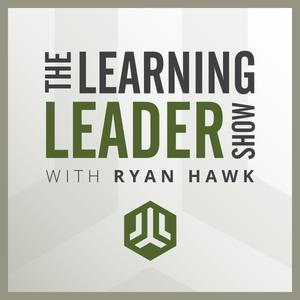
The Learning Leader Show With Ryan Hawk
Ryan Hawk
- 1 hour 18 seconds618: Chase Jarvis - Never Play It Safe, Work Your Creativity Muscle, Trust Your Intuition, Tell Great Jokes, & Become a Transformational Leader
Go to www.LearningLeader.com for full show notes of The Learning Leader Show
Sign up for "Mindful Monday" (it's free) - https://ryanhawk.kit.com/profile
My guest for episode #618 is Chase Jarvis. Chase is a photographer, director, artist, and entrepreneur. He was the CEO of an online education platform called Creative Live from 2014 to 2022. He’s earned countless awards for his photography and creative work including a Pulitzer Prize for a New York Times story he contributed to called “Snow Fall.” He’s also the author of multiple books including Creative Calling and Never Play It Safe.
Notes:
- Opening Joke: "What has 52 teeth and holds back a monster?"
- We are all wildly creative. It is trained out of us as we grow older. Creativity is foundational to all human beings. It’s on us to tap into our creativity and get it out of us to help solve problems, to create optionality, and to be innovative. Regardless of your job, becoming more creative will make you better at it.
- Play infinite games with transformational people. It seems like when we give to others, genuinely try to help them, and have a service orientation, good things happen to all. There are transactional people and transformational leaders. Let’s strive to be transformative and play the long game with high-character people.
- Transactional leaders are infuriating. Transformational leaders are inspiring.
- “A bird sitting on a tree is never afraid of the branch breaking, because its trust is not on the branch, but on its own wings.” Believe in yourself and your ability to bounce back if the thing doesn’t go your way. Set up a series of experiments. Not all of them will work. You’ll be better for having tried, and tried again, and then again. We learn from both our successes and our failures.
- Initially, Chase planned to attend medical school after graduating from undergrad. A few weeks before his graduation, his grandfather died and left all his photography equipment to his grandson.
- “Security is mostly superstition. It does not exist in nature, nor do the children of men as a whole experience it. Avoiding danger is no safer in the long run than outright exposure. Life is either a daring adventure or nothing.” - Helen Keller
- "Safety is an illusion. It does not exist in nature, so why then do we seek it?
- "Playing it safe is about fear. And fear is only optimized for survival--not creativity, happiness, joy, connection, harmony, fulfillment, or any of the gifts you have to give or receive in this life."
- Intuition is everything. What if we started paying attention to that?
- "I don't know why they call us founders. I didn't find anything. I built that shit. We are builders."
- There are 7 basic levers for life:
- Attention
- Time – NYU Professor James Carse. Finite and infinite games. Treat life like an infinite game. What’s the difference between systems and schedules? (why are systems better?)
- Intuition – The benefits of compounding trust. Chase's wife Kate. First met on a beach just after high school. Sparks were present, but no fire. “She had a special quality I couldn’t quite place.” Went to college 1,500 miles apart. All along it was your intuition that kept you on notice. How do you know when it’s your intuition speaking? Why is playing it safe the riskiest thing we can do
- Constraints - What can we learn about constraints from Stefan Sagmeister?
- Play - What can we learn about play from Novak Djokovic?
- Failure - Melissa Arnot Reid – Replaces the word “fail” with the word “live” – Instead of saying “I’m afraid to fail. She says I’m afraid to live.”
- Practice - Purposeful practice. Anders Ericsson
- Keynote speaking - Don't be a robot. Have fun. Let it rip. Results are better in a better state of mind.
- Do tiny experiments when the stakes are low.
20 January 2025, 12:00 am - 55 minutes 36 seconds617: Adam Galinsky - How To Inspire Others, Build a Team, Speak Up For Yourself, Thrive Through Adversity, & Become Their Favorite Boss
Go to www.LearningLeader.com for full show notes for episode #617 with Adam Galinsky
Notes:
- 10 Words - “We are not going down. We are going to Philly.” The composure of pilot Tammy Jo Shults after the side of her airplane exploded. Leadership is needed most when things go bad. How do you respond when adversity strikes? Those are the moments when we must be prepared to share the vision and help our team stay the course.
- EMTs asked, "How did you get through security? You have nerves of steel. You don't even have an elevated heart rate."
- The 1992 cockpit study of pilots. Did more errors happen at the beginning or the end of a 19-hour flight? You’d assume the end because of exhaustion. However, more errors happen at the beginning of the flight because the crews don’t know each other yet. How does this translate to your team? It’s imperative to genuinely care and get to know the people on your team. Host barbeque parties, ask questions, and genuinely LEARN about the people you’re leading. Those aren’t soft skills, those are essential skills.
- What did Adam learn from his parents? The idea of Kaizen, is a Japanese business philosophy that promotes continuous improvement through small, incremental changes. Kaizen means "good change," "change for the better," or "improvement."
- Transactional leaders are infuriating. Transformational leaders are inspiring.
- Great leader exercise: "Tell me about a leader that inspired you..." What qualities do they possess? "Courage, Optimism, Generous."
- Inspire - the universal path for leading yourself and others
- Build habits - floss teeth before brushing. Write thank you notes.
- Moments of Greatness -- Elks basketball
- Team thank you notes - Rob Kimbel
- Columbia football coach -- "Who can I yell at?" Need to know who can handle it.
- Ron Ullery -- Share the vision early. 1:1 conversation, bring your leaders in.
- Adam did not get tenure when most thought he deserved it. They messed up by not sharing the vision until after, but then they made it better by sharing and showing him love. He then turned down Harvard to stay at Northwestern because of it.
- Vision - Big picture. Put context for behavior. Why is consistency important?
- The Great Gatsby and his dad. Greenlights.
- When you're thinking about trying to persuade others, you persuade yourself.
- Parenting -- When you flip out, they do too. We set the tone.
13 January 2025, 12:00 am - 10 Words - “We are not going down. We are going to Philly.” The composure of pilot Tammy Jo Shults after the side of her airplane exploded. Leadership is needed most when things go bad. How do you respond when adversity strikes? Those are the moments when we must be prepared to share the vision and help our team stay the course.
- 52 minutes 6 seconds616: Bob Stoops- Building a Winning Culture, Connecting With People, Creating a Coaching Forest, Caring For Your Team, & Winning Championships
Full show notes at www.LearningLeader.com
Mindful Monday is the best way to start your week. Sign up for free here: https://ryanhawk.kit.com/profile
Bob Stoops was inducted into the College Football Hall of Fame as a coach in 2021. He was the head football coach at the University of Oklahoma from 1999 to 2016. He led the Sooners to a 191-48 record over his career. His 2000/2001 team won the national championship. He earned the National Coach of the Year award the same season. Since 2020, Stoops has been a head coach in the XFL, winning an XFL Championship in 2023 with the Arlington Renegades. He played college football at the University of Iowa, earning team MVP his senior year as a defensive back.
Notes:
- Coaches Bob has worked for: Hayden Fry at Iowa, Bill Snyder at Kansas State, and Steve Spurrier at Florida. He's worked for some amazing coaches.
- Relationships are everything. You must connect with people. You must be authentic. Learn from other coaches, but you have to be yourself
- Sherri Coale: “One of my favorite things about him is he’s the busiest man on the planet but never appeared that way. That’s a skill and an art. That fascinates me.”
- What makes a great head coach? They relate to people. They care about them. They can motivate and influence by clearly sharing the vision of the program and inspiring others to get on board. They are decisive people. Most importantly, they know how to connect with people. All leadership is a people business. If you can’t connect with others, you’ll probably struggle.
- Creating a “coaches forest” (beyond a tree) - Mike Stoops, Mark Mangino, Mike Leach, Bo Pelini, Kevin Sumlin, Kevin Wilson, Lincoln Riley, and more. How has Bob prepared so many guys to be successful head coaches?
- Hiring – “I always tried to hire people smarter than me.” A lot of people say this, but not all do this. Coach Stoops looked for people who had a track record of performance… And then he used his gut instincts after he spent time with him. He paid attention to how they treated his secretary, how they treated the waiter at lunch… Some call those the little things, but they were very important to Coach Stoops
- The overarching theme of the entire conversation was the simplicity of how Coach Stoops built his program. He didn’t try to overcomplicate anything. He knew he wanted coaches who were accomplished, high-character people. And he wanted tough players who loved football. Their offenses may have looked exotic but they didn’t have a ton of plays installed. They focused on what they did and then practiced it relentlessly so that they would execute better than their opponents. I think there’s something beautiful in the simplicity with how he’s built his program and the results speak for themselves.
- Great players want to be coached - Jeremiah Smith, Adrian Peterson.
- What he looked for in players: They have to LOVE football. Need to be tough and physical. Someone like Dan Cody. From Oklahoma, was skinny, and nobody on the staff wanted to give him a scholarship, but Coach Stoops did, and he turned out to be a great player. Liked to keep local guys home.
- Off-season workouts create the culture of the team. "We won because we outworked everyone."
- The attitude of the national championship team - "They were tired of being kicked around." And "I shared with them the history of Oklahoma and let them know the way it should be. When we started, they were a losing team."
- Josh Heupel - The most valuable recruit ever for Coach Stoops.
- Mike Leach was a 1 of 1. An original. He seemed relaxed and casual, but he was also very demanding that they do it right. He was also focused on just a few plays instead of trying to do everything. FOCUS. Do what we do
- Wife Carol - Impressive leader at Mary Kay. Won a pink Cadillac 16 years in a row. National Sales Director.
- Life/Career Advice - Go hard, be tough, be true to yourself, enjoy the struggle, and look forward to the fight. Nothing great happens without going through struggles first.
6 January 2025, 12:00 am - Coaches Bob has worked for: Hayden Fry at Iowa, Bill Snyder at Kansas State, and Steve Spurrier at Florida. He's worked for some amazing coaches.
- 1 hour 3 minutes615: Brad Thor - The Art & Science of Storytelling, Creating Surprise, Billions, Ray Donavon, & The Willingness (& Ability) To Break The Rules
Go to www.LearningLeader.com for full show notes and all episodes of The Learning Leader Show
Notes:
Brad Thor best selling author of 22 thrillers...
- Excellence as a leader… What has Brad seen from the military leaders he’s studied: Empathy - Understand what it’s like from their perspective. LISTEN - Care for your people. Actually LISTEN to them and be there. Creativity. Innovate, and think of new creative ways to solve problems.
- Effective storytelling - Don’t start with the weather. Leave out the parts people skip. Don’t be boring. This same advice is useful for leaders when communicating with your team. Put yourself in their shoes. How can you most effectively share your message without being boring. The more entertaining it is, the more likely they’ll remember it.
- Effective storytellers - Plotters (outlines, Dan Brown), Pantsers (write by the seat of your pants). Brad is a pantser.
- Take the first 4 ideas and throw them out. You need the element of surprise. Create surprise.
- Be comfortable breaking the rules.
- Loves Ray Donavon and Billions for the element of surprise
- "No joy in the writer, no joy in the reader."
- "No surprise in the writer, no surprise in the reader."
- Brad has served as a member of the Department of Homeland Security’s Analytic Red Cell Unit.
- Excellence as a leader (McChrystal) - Empathy, Listen, Creativity.
- PBL - Problem-Based Learning. John Bettis (country singer). How do you recharge your battery? International travel. Immerse yourself in another culture.
- Loves politics. Ran for President.
- Advice for writers – “Gotta Keep Writing” Mary Higgins Clark did it for 2 hours each morning before her family woke up. Whatever it is we want to be great at, we have to get the reps. Consistency beats intensity.
00:53 The Art of Storytelling
04:13 Elements of Effective Storytelling
08:26 The Importance of Surprise in Storytelling
11:33 Writing Process and Challenges
20:43 Research and Realism in Writing
27:04 Leadership Lessons from Writing
30:59 The Importance of Open-Mindedness
32:01 Pre-Publishing Feedback Process
35:09 Homeland Security and the Red Cell Unit
39:05 Maintaining Creative Energy
42:38 Political Ambitions and Leadership
50:57 Advice for Aspiring Writers
54:36 The Benefits of Reading Fiction for Leaders
56:43 Conclusion and Final Thoughts
30 December 2024, 12:00 am - 54 minutes 36 seconds614: David Yeager PhD - The Science of Motivating Young People: A Groundbreaking Approach To Leading The Next Generation (Author of 10 to 25)
Go to www.LearningLeader.com for full show notes. The Learning Leader Show with Ryan Hawk
This is brought to you by Insight Global. If you need to hire 1 person, hire a team of people, or transform your business through Talent or Technical Services, Insight Global's team of 30,000 people around the world have the hustle and grit to deliver.
Notes:
- The Pete and Leona story - What will people say about you at your funeral?
- "They changed my life and the lives of my entire family."
- Tough love out of 100% care for you.
- Be tough AND supportive.
- Don't lower your standards.
- High standards. High support.
- 10 to 25 - Find the right trigger for motivation. Find out what they care about. They need meaning and significance. They want status and earned respect.
- Are children less afraid of their parents now than they used to be? Dan Gilbert calls this the "illusion of moral decline." It's been happening for 75 years.
- The Parental Nagging Study - A common tactic adults use to get teens to “pay attention.” Research shows that nagging triggers the emotional part of a teen’s brain, shutting down their ability to think logically. They’re not ignoring you on purpose—they’re simply wired to tune out. A better way? Speak calmly and neutrally to engage the part of their brain that handles planning and decision-making. This opens the door to real conversation.
- Satya Nadella’s Model, Coach, Care philosophy at Microsoft. This is the opposite of Jack Welch’s rank and yank style at GE. Remember, the stack ranking methodology limited innovation and stopped people from taking any type of risk. We want to model the right behavior, coach others, and ensure they know we care for them so they feel the support they need to take risks, sometimes fail, get back up, and work to innovate.
- Theory X = Rank and yank. It stifled innovation for fear of failure and getting fired.
- Theory Y = No stack rankings. Built on connecting leaders with their people. Still high standards and demanding. Followed the "Model, Coach, Care" methodology. This is what's happening today at Microsoft. Be a place where people want to work.
- The Mentor's Dilemma - Stef Okamoto - honest, direct, and supportive.
- The "mentor's dilemma" refers to the challenge of balancing honest, critical feedback to young people while still maintaining their motivation and self-esteem, as this age group can be particularly sensitive to perceived criticism and may easily feel discouraged or disrespected if not approached carefully; essentially, it's the struggle between pushing someone to improve and potentially damaging their confidence by being too harsh.
- The mentor mindset: A mentor mindset can be adopted by using practices such as validating young people's perspectives, asking them questions, and holding them to high standards.
- Questioning – Kate, a mom of two who lives in Chicago, whose oldest son was a sophomore came home one night from a party drunk and high. Kate responded with a combination of yelling and prosecuting… She instigated an interrogation and not a two-way conversation. Instead of interrogating, get curious. They had a reason for what they did. Figure out why. What's your plan?
- Ask questions to get them to own their thinking and share it with you.
- Advice - Don’t accept some perceived path. Be reliable, show up, do the work, and ask for more work. Add surplus value. Whatever you’re being paid, focus on delivering 10x more value. Find a way to do that and your employer will beg to give you a raise and promote you.
23 December 2024, 12:00 am - The Pete and Leona story - What will people say about you at your funeral?
- 1 hour 5 minutes613: Mo Bunnell - Giving To Grow, Falling In Love With Questions, Mastermind Groups, Delaying Gratification, Long-Term Planning, & Investing In Relationships
Go to www.LearningLeader.com for full show notes
The Learning Leader Show With Ryan Hawk
Notes:
Mo Bunnell is the author of Give to Grow, The Snowball System, and the founder of Bunnell Idea Group (BIG), who has trained tens of thousands of seller experts at over 400 clients all over the world.
- I wake up every morning looking to help my friends succeed, and some just happen to be clients. — Proactively thinking of ways to add value to others is a great way to build a meaningful life.
- Our brains think literally. Relationships grow exponentially.
- Give consistently to grow relationships.
- Celebrate incremental progress. Mo writes in a journal the growth of himself, his business, and his customers. We all should be better at celebrating incremental progress. Teresa Amabile’s research shows that this leads to a more enjoyable life.
- August 4, 1984, was a meaningful day for his family. (Dad’s alcoholism. That was the day of his last drink)
- The difference between doing the work versus winning the work
- Example: You win the work by asking lots of questions. You do the work giving answers.
- Every successful career hinges on two things: Doing The Work and Winning The Work. Both delivering value on the current work and developing the relationships that create future opportunities are vital for long-term success. Whether you’re in a new role or want new outcomes, the most powerful results come from prioritizing both Doing The Work and Winning The Work.
- Ask questions – Mo shares 50+ questions to ask. Ask self-disclosure questions. Those are questions that only that person can answer.
- Fall in love with the problem.
- Pronoia – The world is out to help you succeed.
- People can live in 1 of 3 ways.
- Drift - Stay busy. Answer emails.
- Driven - Hyper emphasis on one thing at the detriment of others (triathlon guy)
- By Design - Write down where you want to be and make a plan to do it. On purpose.
- Delayed gratification:
- Weekly planning process
- Offer 3 proactive change agent ideas
- Mo is in 5 masterminds
- Shawn Blanc in Breckenridge. Net givers.
- MASHUP - His house. Help others. Ask for help.
- Elite Adventure athletes
- GivetoGrow.Info
- MASHUP! Mastermind of Awesome Super Human Unreal People
16 December 2024, 12:00 am - 1 hour 3 minutes612: Lawrence Yeo - Dissolving Envy, Practicing Curiosity, Writing to Think, Establishing Values, Building Confidence, Being Ambitious, Moving People to Tears, & The Power of Consistency
Go to www.LearningLeader.com for full show notes and to listen to all episodes of The Learning Leader Show with Ryan Hawk
Lawrence Yeo is a storytelling teacher and the founder and writer at MoreToThat.com. He writes stories about the nuances of the human condition. He’s become one of my favorite writers over the past few years and regularly makes me rethink what I believe.
Notes
- Envy: Envy is inversely correlated with self-examination. The less you know yourself, the more you look to others to get an idea of your worth. But the more you delve into who you are, the less you seek from others, and the dissolution of envy begins.
- Curiosity is gratitude for the unknown – “The key to cultivating curiosity is to have a healthy relationship with uncertainty.”
- Lawrence is called the L.S.E. by his wife. The Life Story Extractor.
- Ask More Questions to Those You Love - It’s quite shocking how few questions you ask when you’re with people you’re comfortable with. If you’re no longer curious to know about the person in front of you (friend, wife, parent), then that relationship is devoid of life.
- Your Values: Your values are as unique as your genes because no one shares the exact set of experiences and insights that were required to form them. They are the fingerprints of your being, and they are the invisible forces that guide everything you touch. Integrity is the ability to navigate the outer world without discounting your inner values. There is an anchor of authenticity that you’re unwilling to budge, no matter how fervently people want you to.”
- Confidence is a commitment to trusting your inner compass, despite how strong the outer winds are. If you do the work to know yourself, then you’ll realize that no external voice can convey the inner complexities you embody. And through that awareness, you’ll reliably choose your intuition above all else.
- The Problem with Following Your Passion - Ultimately, you can’t live off your love for something. It doesn’t matter how powerful your inner engine of expression is; without the fuel of money, you will stall out and be left on the side of the road. And like it or not, the only way for this fuel to be provided to you is to create something valuable enough to warrant that exchange.
- Ambition - Ambition is critical to the development of a healthy mind. Not only does it allow you to know who you truly are, but it also acts as a gateway to humility. Since ambition is about putting the bar ahead of you, you’ll understand your shortcomings in a visceral way."
- Ambition breeds humility. Always setting the bar ahead of where you are. "I'm not quite there yet."
- “This email brought me to tears.” -"Hi Lawrence, I just came across your site and love what I am reading. Great insights and reflects a lot of my thoughts lately, like the last 20 years. I'm 72, stage four cancer, and the happiest I've ever been because I have the luxury of being able to examine my life. Best self-help ever. I'm looking forward to reading more of your writing."
- Writing:
- 2 types of writing:
- Writing to think.
- Writing to present.
- Journal vs. Diary. Journal is asking why you feel the way you do. A diary is a catalog of what happened.
- 2 types of writing:
- Have a job that acts as a patron for your creative work.
- Moretothat.com -- There's always something deeper.
- Advice - Learn storytelling. Consistency is the driving force of your curiosity.
9 December 2024, 12:00 am - 52 minutes 35 seconds611: Codie Sanchez - How To Build Extraordinary Wealth Through Ordinary Businesses (Main Street Millionaire)
Go to www.LearningLeader.com for full show notes
The Learning Leader Show with Ryan Hawk
Codie Sanchez is an entrepreneur and investor known for founding Contrarian Thinking, a media and business education company. She has a diverse background, including entrepreneurship, finance, and journalism. Through her book "Main Street Millionaire," she advocates for wealth-building by acquiring small businesses and shares her insights on financial independence and business success. Codie emphasizes practical, contrarian approaches to wealth and leadership.
Notes:
- Her dad always said to her: ‘You’re not going to be a princess, you’re going to be the president’ – It’s a great reminder of the power we have as leaders to believe in someone and raise their level of expectations because you see something special in them. Codie was glowing while talking about her dad.
- How Codie earned a job at Vanguard. She went to conferences. She met people. She got IN THE ROOM and took action. And then when she got her opportunity, she led with her curiosity, asked questions from the woman she met with, learned, read the books she told her to read, and followed up. Showing up, doing extra, and following up are a great way to earn a job that you might not be qualified for.
- How you start and end your meetings. What type of energy do you bring to the space? Remember, you no longer get to be energy-neutral as a leader. You’re either lifting the room up or taking it away. We want to add energy additives to the rooms we enter.
- One of Codie's favorite books – Letters to a Young Contrarian by Cristopher Hitchins. “What I like about Christopher Hitchens, he pushed back against the common narrative in a time where to be an activist was really frowned upon”
- “He was what the people these days that say they're activists actually are. He really had no loyalty to any type of thought; he was simply trying to find the truth. He was the inspiration for contrarian thinking”
- Career Path – “I don’t believe that humans have linear paths ever. Anyone who has had an interesting career in my opinion has had a completely divergent set of experiences.
- High Performers:
- They hate small talk.
- Are not okay with wasting your time.
- Do what they say they’re going to do.
- Do it with urgency.
- Are obsessed, not just interested.
- Goal Setting: “If you want to be a person who hits your goals: Skip setting goals and set sacrifices. What are you willing to give up to get what you want? That is the missing piece to winning. Every one of your goals has a price."
- Codie's Anti-Goals: Being an employee/work for others, Selling other people's products, Speaking for free, Coffee meetings.
- The richest self-made woman in the US is… Diane Hendricks (co-founded the largest wholesale roofing, siding, and window distribution company). There are billions in the boring.
- Writing = Clarifying Your Thinking
- Writing helps Codie think clearly and organize her thoughts.
- The process of writing demands coherence and structure, unlike verbal communication.
- 4 Parts to buy a business - Cover debt, Cash to have an operator, Money to make a salary, Operating cash.
- 3, 9, 12 method - Learn the 10 steps in the first 3 months. Get in on a deal. Stabilize.
- Boring Businesses - Laundromats, car washes, and port-a-potty services can be very profitable. They are less glamorous but have a higher success rate compared to sexier industries.
- Advice - Meet with a small business owner. Ask to shadow them. Get curious. 42% of the population works for or in a small business.
2 December 2024, 12:00 am - 1 hour 5 minutes610: Jeff Janssen - The Commitment Continuum, Walt Disney, Holding Others Accountable, Team Captains, & The 7 Secrets of Successful Coaches
Go to www.LearningLeader.com for full show notes.
Books: The Score That Matters, The Pursuit of Excellence, Welcome to Management
Notes:
- The Commitment Continuum
- Resistant
- Reluctant
- Existent - Stealing scholarships (sandwich eaters)
- Compliant - Box checkers
- Committed - Heart is into it. They do extra. They are bought in.
- Compelled (Obsessed) - On a mission.
- Do an audit first of yourself. Where am I on that continuum? And then each member of your team. The goal is to get each member closer to becoming committed and compelled.
- Team audit - Where is everyone? People can drift down if their needs aren't met.
- For existent and compliant - Shift mindset to "I get to be here!"
- For committed and compelled - Keep them challenged. Put them in leadership roles.
- The art of leadership - Make it easier to move up on the commitment continuum.
- Walt Disney - The little things are the big things. Jeff experienced this firsthand when he went on a Disney cruise and saw the workers polishing the railings on the cruise ship early in the morning. The same is true for the janitor mopping the floor at NASA. There’s a story about President John F Kennedy in 1962. He was at NASA and he asked the janitor what he was doing. The janitor replied, “I’m helping put a man on the moon.” The leader should be praising everyone involved in the mission and celebrate their role and its importance.
- Holding your teammates accountable - “We’re not calling you out, we’re calling you up.” The encourager and the enforcer help raise the standards and encourage others to aim higher. That’s the role of the leaders on great teams. “We’re not calling you out, we’re calling you up.”
- What's our vision?
- Am I embodying the standards myself?
- Have we clearly set the standards and got buy-in? "These are the expectations and standards of our program."
- Performance and behavior metrics
- Praise people when they meet the standard
- The best teams practice so much that they can't get it wrong.
- Team Captain's Leadership Manual. Mike Fox. Can you lead yourself first? Commitment. Composure. When it hits the fan, can you stay poised? Character: Can I trust you?
- How do we get people excited to be part of the leadership development program? Make it a privilege. They have to apply and get accepted into the program. They "get" to do it. Make it relevant to their lives. Give real-world strategies.
- The encourager - Calls out great work
- The enforcer - "We need more from you."
- The servant - It's not about you or your stats. It's about serving others.
- The Seven Secrets of Successful Coaches
- Character-based people. They do the right thing. People trust them.
- Extremely committed to the mission and the team.
- Competent
- Care
- Confidence Builder
- Communicator (great listener)
- Consistent
25 November 2024, 12:00 am - The Commitment Continuum
- 1 hour 3 minutes609: Eric Jorgenson (CEO of Scribe) - The Obsessive Genius, Flawless Fundamentals, Building Mountains of Leverage, The Power of Writing, All Things Naval, & Manifesting Your Dream Job
Go to www.LearningLeader.com for the full show notes of The Learning Leader Show with Ryan Hawk.
Eric Jorgenson is the CEO of Scribe Media, the largest Professional Publisher. He’s also the author of The Almanack of Naval Ravikant: A Guide to Wealth and Happiness and The Anthology of Balaji. His books have sold over 1 million copies and have been translated into 40 languages.
Notes:
- The obsessive genius. Eric likes to invest in founders who have been obsessively trying to solve a problem for years. They are myopically focused on that one thing. They have a depth of expertise in the area where they focus. Eric has developed the skill to get good at recognizing that genius in others and that’s helped him make good investing decisions.
- He is an investor in dozens of (borderline crazy) deep-tech startups through Rolling Fun. They fund obsessive geniuses building utopian technologies.
- Eric’s first 90+ days as the CEO of Scribe: He spent as much time as possible learning from the current members of the team. Leading with curiosity, asking questions, listening, and leading with trust. Being both trustworthy and willing. You don’t have to earn my trust, you have it.
- "Flawless on the Fundamentals" - The one phrase Scribe is focused on.
- Your content diet: It's more important than a healthy/wellness/food diet. "If you're taking in bad information, you're becoming a moron." You want high-signal sources of information.
- An audience of 1 - "I wrote that book for myself."
- Bezos - Great compression of ideas and communicating them to the team. Focused on one thing.
- Why write a book with Scribe instead of a traditional publisher... You want 100% ownership of your IP
- We talked in depth about Naval Ravikant and his viral Twitter thread titled, “How to get rich without getting lucky” – Here are some of the tweets from that thread:
- Seek wealth, not money or status. Wealth is having assets that earn while you sleep. Money is how we transfer time and wealth. Status is your place in the social hierarchy.
- Understand that ethical wealth creation is possible. If you secretly despise wealth, it will elude you.
- Ignore people playing status games. They gain status by attacking people playing wealth-creation games.
- Pick an industry where you can play long-term games with long-term people.
- Pick business partners with high intelligence, energy, and, above all, integrity.
- Don't partner with cynics and pessimists. Their beliefs are self-fulfilling.
- Learn to sell. Learn to build. If you can do both, you will be unstoppable.
- Specific knowledge is found by pursuing your genuine curiosity and passion rather than whatever is hot right now.
- Insane and Pragmatic – Great founders are insane and pragmatic. Yes, both.
- Leverage – How do you build a mountain of levers? (Levers are force multipliers. This is how some people can accomplish 10x, 100x, or 1,000,000x what others can. Leverage can multiply outcomes from your effort, your skill, and your judgment.) “You can make it big without accountability. You can make it big without specific knowledge. But if you don’t have leverage, you’re never going to make real wealth. Leverage is the most important component of the principles I’ve discussed.” - Naval
- Transformation Through Writing: Writing a book can be a transformative process that deeply embeds certain mental models and knowledge.
- Interview Process: Engaging with a skilled interviewer can help clarify ideas, which is particularly valuable for busy executives who wish to author books but lack the time to write them themselves.
- Impact of Books: Books can play unique roles in positioning leaders and sharing knowledge, which is an invaluable tool for personal branding and legacy.
- Learning from Experts: Eric believes that his talent lies in recognizing and synthesizing the genius of others, which he shares through his books and investments.
- Professional Growth: Through interacting with talented individuals and absorbing high-quality content, Eric has developed a nuanced understanding of what drives excellence.
18 November 2024, 12:00 am - The obsessive genius. Eric likes to invest in founders who have been obsessively trying to solve a problem for years. They are myopically focused on that one thing. They have a depth of expertise in the area where they focus. Eric has developed the skill to get good at recognizing that genius in others and that’s helped him make good investing decisions.
- 59 minutes 21 seconds608: Anthony Pompliano - (How To Live an Extraordinary Life) Luck Is Not Real, Surround Yourself With Compounders, Fire Your Boring Friends, Get On The Plane, Practice Simplicity, & Taking Big Risks608: Anthony Pompliano - (How To Live an Extraordinary Li
Go to www.LearningLeader.com for full show notes
Read our book, The Score That Matters https://amzn.to/3Yrxfj8
Notes
- Luck is not real – “Luck is something we conjure in our minds to grapple with the consequences of whatever life may throw our way. Luck is a physiological concept. It’s determined by how we view a situation. Academic studies show that you can become luckier simply by telling yourself that you are lucky.” Pessimists sound smart, but optimists change the world. Believe in yourself. Have agency. Strive to make something happen.
- "Luck is the flip side of risk. They are mirrored cousins, driven by the same thing: You are one person in a 7 billion player game, and the accidental impact of other people’s actions can be more consequential than your own." - Morgan Housel
- Surround yourself with compounders and fire your boring friends– Being around other ambitious people who are willing to push you will make you better. Strike the balance between being loyal to longtime friends, and doing anything for them, but spending the bulk of your time around people who will push your edges and make you think bigger.
- Fire your Boring Friends - “If you are optimizing for living an extraordinary” life, you have to fire all the boring friends and find people living extraordinary lives.”
- You don’t get what you don’t ask for. I love the story of Anthony meeting his future wife, Polina, for coffee and asking for the next date for that same night. The answer is NO if you don’t ask. It’s worth the potential rejection because the upside is so great. In this case, they got married and have two children. The people who sustain excellence are not afraid to make the ask.
- Get on the plane -- When in doubt, go see them in person.
- "Experience is a liability when it comes to setting expectations." Sometimes, ignorance is bliss. Not knowing that something is supposed to be hard can be useful.
- Respect other people's time - “When I was playing football in college one of our coaches used to say, “5 minutes early is on time and on time is late.” By respecting other people's time they will realize you are a serious person.
- Childhood is not a crutch — Don't have a victim mindset to use childhood as a crutch for poor behavior. “It’s easy to use your childhood as a crutch instead of seeing it as a chisel.” - Cameron Hanes
- Simplicity signals mastery — Tim Urban is the master at this. As a writer and/or teacher, your writing should make the reader feel smarter, not dumber. Using big complicated words and sentences shows that you don’t know what you’re talking about.
- The world seems to separate itself into two groups - the people who never stop learning and everyone else.
- Document Good Ideas – Ideas run the world. “I created a system that works well for me. I broke everything down into four areas where I could find a good idea. Books, social media, conversations, and audio/video content.
- Advice: "Seek risk. What is the riskiest thing you can do? The greatest returns are on the other side of risk. Run towards the risk."
11 November 2024, 12:00 am - Luck is not real – “Luck is something we conjure in our minds to grapple with the consequences of whatever life may throw our way. Luck is a physiological concept. It’s determined by how we view a situation. Academic studies show that you can become luckier simply by telling yourself that you are lucky.” Pessimists sound smart, but optimists change the world. Believe in yourself. Have agency. Strive to make something happen.
- More Episodes? Get the App
Your feedback is valuable to us. Should you encounter any bugs, glitches, lack of functionality or other problems, please email us on [email protected] or join Moon.FM Telegram Group where you can talk directly to the dev team who are happy to answer any queries.
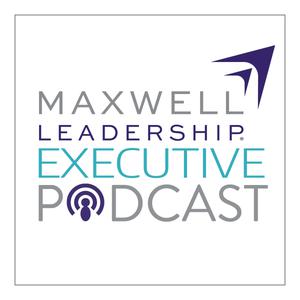 Maxwell Leadership Executive Podcast
Maxwell Leadership Executive Podcast
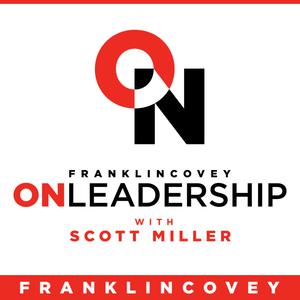 FranklinCovey On Leadership with Scott Miller
FranklinCovey On Leadership with Scott Miller
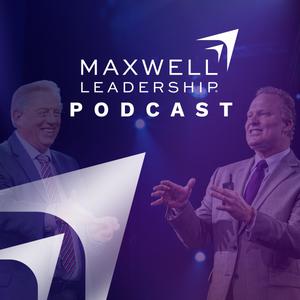 Maxwell Leadership Podcast
Maxwell Leadership Podcast
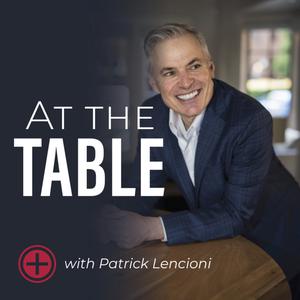 At The Table with Patrick Lencioni
At The Table with Patrick Lencioni
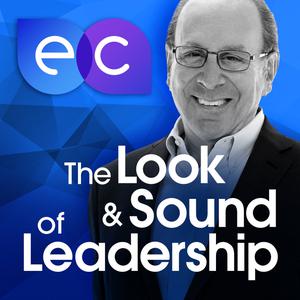 The Look & Sound of Leadership
The Look & Sound of Leadership
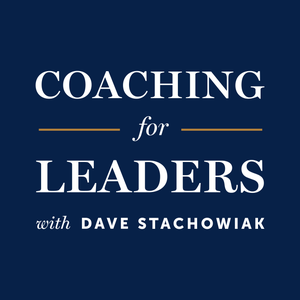 Coaching for Leaders
Coaching for Leaders